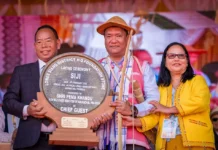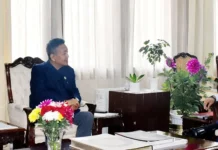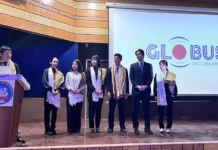Bagiso Hakung
In the last article, I indicated how a voluntary reading movement can directly take the benefits to school education, through a network of people’s libraries.
I have witnessed many children and adults in the Lohit region transform themselves after visiting the youth libraries – from having little reading skills to becoming confident learners, readers and thinkers.
One of the unique initiatives of the Lohit Youth Library movement is ‘RASA’ (Read Aloud Session for All). In it, volunteers from the Bamboosa Library train BEd students from the local Denning College for Teacher Education to be efficient educators. They then jointly conduct sessions in Bamboosa Library for government school students. I have observed that RASA’s sessions for various schools have sparked students’ interest, and students have indeed become more interested in reading and learning new things. RASA is playing an instrumental role and is revolutionary in nature. If this model is welcomed and embraced across our state, it will be a significant step and can undoubtedly push our system into a new realm of learning. It is imperative to acknowledge the existence of the library movement and see it as one of the most important elements in the journey of educational transformation in Lohit and Anjaw.
The library activities are dynamic and quite diverse. Apart from RASA, the volunteers also conduct weekly activities, like capsule programmes organised twice or thrice a week where children from schools on the outskirts of Tezu come and take part. The volunteers have trained anganwadi workers in reading aloud to little children. Sessions are also run on awareness, career counselling and other skill-based training, with the help of the professionals. The libraries are centres of exposure and experience because here readers get to freely interact with so many professionals.
Journey of the volunteers
The journey of the volunteers is also fascinating; I have observed that all of them come from humble family backgrounds. Most of their parents are neo-literates, and hence the volunteers are most likely, the first generation in their families to receive advanced formal education. Interestingly, they have been serving the library without any remuneration and would never wish for any in future as well. I can say that the library movement might not have created civil servants, doctors, or engineers, yet it’s not impossible either. They are helping to build better readers, social engineers and responsible citizens -isn’t that important?
I have also tried to analyse the lives of the senior volunteers by interacting with them. Their lives would have been entirely different without the library movement. Perhaps they would have been left with no option but to quit schooling or to stop reading altogether due to various issues. This is because they had no one to guide them, and our society was not so keen about girls’ education back then.
The lives of many volunteers have changed because of the library movement. I won’t say the entire credit goes to the library; of course, the volunteers had potential and talent, but the libraries played a significant role in guiding them in the right direction. It’s been 17 years, and the network has grown significantly. Many volunteers have completed studies in various professions: Manisha Halai, the seniormost activist and first MBA graduate, is an aspiring environmental filmmaker from a remote village, Kathan. Behelti Ama, whose unique paintings were exhibited in Delhi; Ashapmai Dellang, who is coming up as a Carnatic music artiste; Laxmi Ngadong, the first air hostess from the Mishmi community; Bahailu Rangmang, an intern at the National Library, Kolkata, are all pioneers. Keselo Tayang, an ace storyteller and soft skill trainer, was invited to speak about the library movement at the prestigious LBSNAA, Mussoorie. Sakelu Chikro presented Kaman Mishmi language at an international conference by NEILAC, Guwahati, while Bethem Maraian, eco-activist, attended a Delhi conference by USAID and Parimal Foundation. Jeenamsi Ngadong and Banika Kri have had their stories published in different magazines. Solina Kambrai, a botany postgraduate, Anjangmai Mam, a gold medallist and Siwani Pul, who had advanced training in IIT Gandhinagar library are all active volunteers. They have also ventured into the translating storybooks into Kaman and Tawra languages.
The volunteers’ journey is inspiring; their unique paths are a result of proper knowledge and guidance, which is what other children need too. Thankfully, the unwavering efforts of dedicated volunteers and well-wishers continue to make a meaningful difference and hope it will continue in future.
In conclusion, I strongly believe that a grassroots movement by volunteers demonstrates that revolution can be a gradual, collective effort, empowering individuals and communities one small step at a time. Further cooperation from the society, student organizations, CBOs, seniors and public leaders is much needed. Our support will help our youth volunteers grow and reach the un-reached areas. Consequently, it will bring substantial changes in our area and embracing literature will give us a new life and society. Therefore, glory to the library movement and more power the volunteers in spreading the joy of reading. (Bagiso Hakung, a postgraduate in economics from Rajiv Gandhi University, is IPR secretary of the All Mishmi Students’ Union.)



